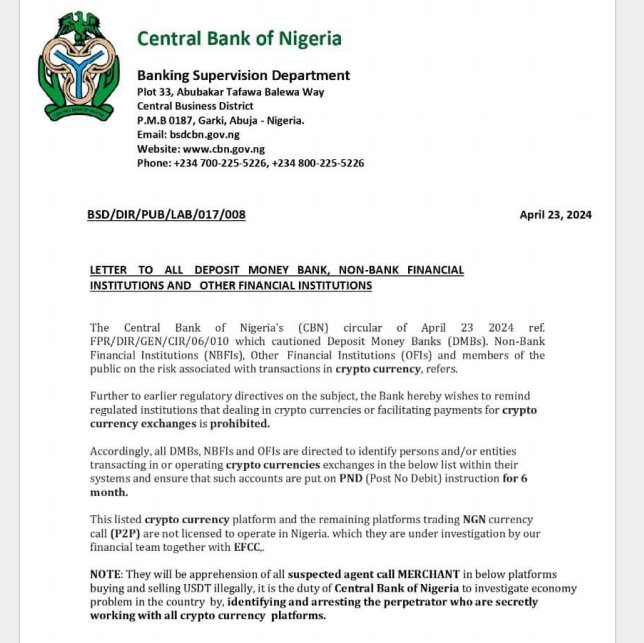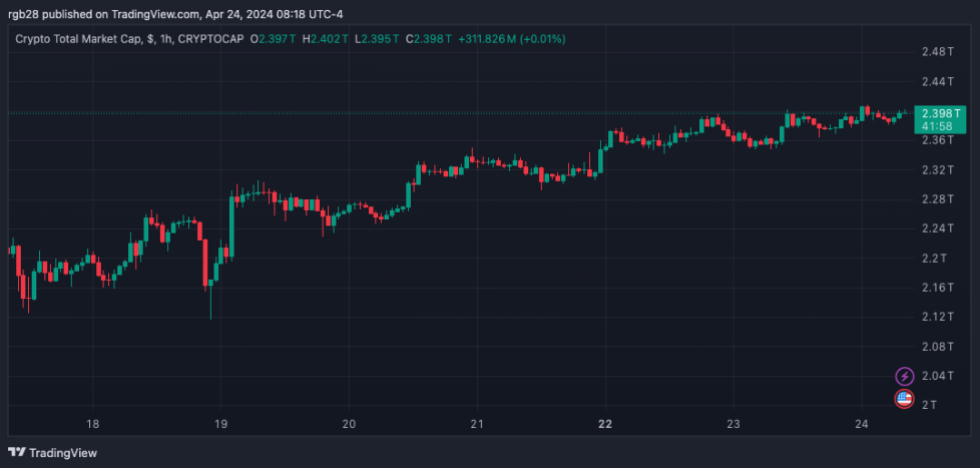Current studies knowledgeable of an alleged round launched by the Central Financial institution of Nigeria (CBN). The doc warned monetary establishments that participating with cryptocurrencies and facilitating operations for crypto exchanges was prohibited.
The information raised alarms as, 4 months in the past, Nigeria lifted the ban that prevented banks and different monetary establishments from working accounts for digital asset service suppliers (VASPs).
Newest Crypto Crackdown Turned Out A Bluff
On Tuesday, studies of a CBN’s deal with on monetary establishments that facilitated operations for crypto exchanges in Nigeria began spreading.
The alleged round “cautioned” Deposit Cash Banks (DMBs), Non-Financial institution Monetary Establishments (NBFIs), Different Monetary Establishments (OFIs), and the general public in regards to the dangers related to crypto transactions.
Alleged round by the Central Financial institution of Nigeria. Supply: X
The doc “reminded” regulated establishments they have been banned from dealing in cryptocurrencies or facilitating operations for exchanges due “to earlier regulatory directives on the topic.”
Nonetheless, the talked about ban was lifted in December 2023 and was adopted by strict tips that enable banks and different establishments to cope with cryptocurrencies below a algorithm.
The alleged round directed DMBs, NBFIs, and OFIs to establish and report all people and entities inside their system that have been “transacting in or working cryptocurrencies” on exchanges.
Binance, OKX, KuCoin, and Bybit have been listed as prohibited platforms. Per the doc, the listed exchanges and different platforms buying and selling the Nigerian Naira within the Peer-to-Peer (P2P) Market weren’t licensed to function within the nation.
As such, these platforms have been “below investigation” by the CBN and the Financial and Monetary Crimes Fee (EFCC). The round ordered the monetary establishments to make sure that the accounts that handled cryptocurrencies have been “placed on PND (Put up No Debit) instruction for six months.”
Moreover, it warned that every one suspected brokers that traded “USDT illegally” may very well be apprehended. The doc said that any breach of the brand new directive would end in “extreme regulatory sanctions” for the concerned events.
Nonetheless, Nigeria’s Central Financial institution clarified on Wednesday that the alleged round was “faux content material.” On an X post, CBN said that the data was unauthentic and didn’t originate from the establishment.
Nigeria’s EFCC Freezes 300 Accounts
Regardless of the CBN round turning out faux, the EFCC lately froze over 300 unlawful foreign exchange accounts that traded on a P2P platform.
Based on an area report on Tuesday, EFCC Chair Ola Olukoyede revealed that the fee suspended the accounts on Monday following a court docket order.
The Chairman defined that the company found a “worse scheme” than Binance’s system, which has been below a regulatory crackdown within the nation. The most important crypto change on the planet and two of its executives are at present dealing with 4 fees for Tax Evasion in Nigeria.
Per the report, Olukoyede affirmed that “there are individuals on this nation doing worse than Binance.” Because of this, these actions have been taken to “guarantee the protection of the international change market and shield the economic system.”
The EFCC considers P2P monetary buying and selling a “scheme” working outdoors the official monetary corridors as, within the final 12 months, over 15 billion Nigerian Naira, value round $11 million, handed by means of one of many foreign exchange platforms.
Crypto Complete Market Cap sits at $2.3 trillion. Supply: TOTAL on TradingView
Featured Picture from freepik.com, Chart from TradingView.com

